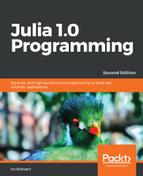For convenience, zeros(n) returns an n element array with all the elements equal to 0.0, and ones(n) does the same with elements equal to 1.0.
range(start, stop=value, length=value) creates a vector of n equally spaced numbers from start to stop, for example, as follows:
eqa = range(0, step=10, length=5) #> 0:10:40
show(eqa) #> 0:10:40
You can use the following to create an array with undefined values #undef, as shown here:
println(Array{Any}(undef, 4)) #> Any[#undef,#undef,#undef,#undef]
To fill an array arr with the same value for all the elements, use fill!(arr, 42), which returns [42, 42, 42, 42, 42].
To create a five-element array with random Int32 numbers, execute the following:
v1 = rand(Int32,5)
5-element Array{Int32,1}:
905745764
840462491
-227765082
-286641110
16698998
